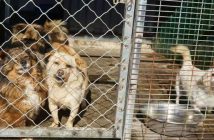
The culture of my youth is best explained as the hyphen in Chinese-American. My parents were born and bred in New York City; my dad in Chinatown, my mom in the Bronx. We lived in the suburbs, a middle ground between the metropolitan city life and countryside of New York.
I grew up with a limited Toisanese vocabulary, reserved for young children. I would funfun (nap), drink nainai (milk), throw out anything that was jaja (dirty), and answer to the nickname Noi Noi, which means small girl.
On occasion, the home phone would ring and the caller would speak a distant language. “Hold on! Hold on! Hold on!” I would say loudly and clearly, while running with the receiver to my dad in the living room, terrified that the caller would hang up. With a sigh of relief, I would hand him the phone: “It’s for you, Dad.”
Besides the occasional Toisanese word, we only spoke English at home; regardless, my life was woven with aspects of Chinese culture.
My daily life was like that of any other suburban dweller during the week, but on the weekends, I was at elaborate Chinese banquets in Chinatown for weddings and birthdays. At a round table covered in red cloth and a lazy Susan, I would unabashedly dissect the crunchy shell of the bird’s nest dish, swallow giant shrimp drenched in sweet mayonnaise,bite into a warm chasiubao (steamed bun) and eagerly await the plate of almond cookies and orange slices that always came at the feast’s end.
I also recall Chinese New Year as an intense day. Firecrackers boomed and crackled, their red paper guts blanketing the street. After parking the car, we would run down Mott Street and cram into my grandmother’s one-bedroom apartment with our extended family. From her window, we would see the dragon and lion dances below, and listen to the resounding boom of drums, overpowered only by the sharp bang of fireworks.
Back in Rockland County, my friends were not trying to escape a fury of ear-splitting firecrackers. There were other shared occasions: Girl Scout campouts at Camp Addisone Boyce, birthday parties on roller skates at The Rink, and sledding down the snow-covered hill behind Tappan Zee High School.
My childhood cannot be classified as typically American or entirely Chinese; instead it was a blend of these two worlds – not unlike your child’s cross-cultural upbringing in Beijing. While I never imagined that I would move east to live as a Beijinger, here we all are, embracing the culture of decades past, walking through the city’s vibrant hutongs, sipping suannai out of ceramic jugs, and watching (and perhaps participating in) elegant taichi in the park. Explore the deepest corners of Beijing with us this month: from local markets to a variety of Chinese cultural activities. Also gain perspective on life in local schools and what it is like for teenagers as third-culture kids.
One of the places I called home in Beijing was at the top of a six-floor walkup. It was a great apartment, but every morning, even on Saturday and Sunday, I was rudely awakened by loud cooing pigeons scratching on the roof at 6am. One day, I told the owner about his pigeons’ disturbance. After an hour of explaining the situation to him, he reasoned that the root of this problem was that foreigners don’t like waking up early, while Chinese people do. “Early to bed, early to rise,” he said, agreeing to let them out of their cage at 7am instead of 6am.
I didn’t argue with his logic, and laughed along with him instead. Everyone knows that living in Beijing is what we make of it, so we might as well make the most of all of our experiences.
This article is excerpted from beijingkids April 2012 issue. View it in PDF form here or contact distribution@beijing-kids.com to find out where you can pick up your free copy.



